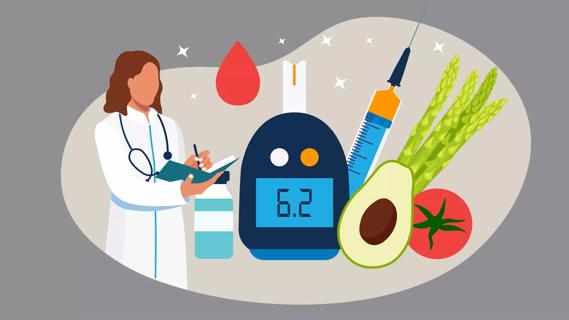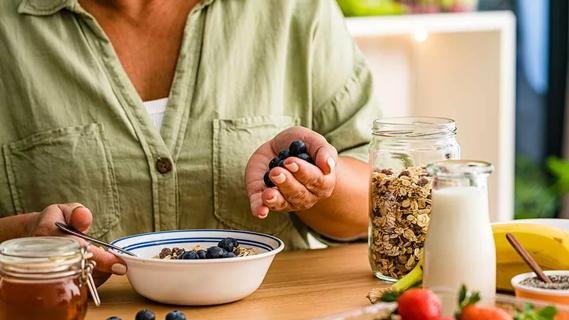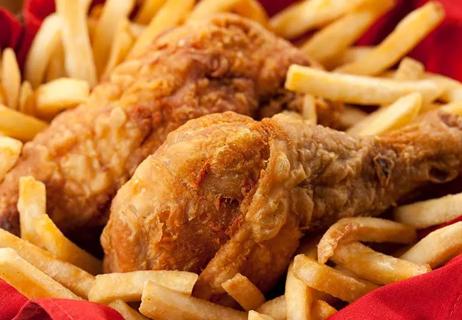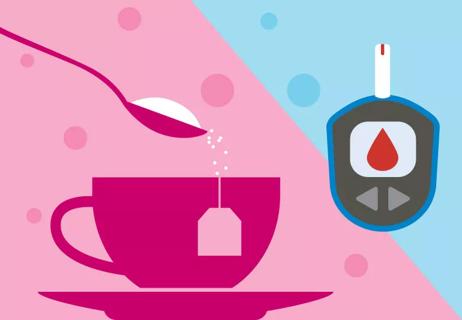Think long-term, lower-calorie plans

Are you trying to lose weight while managing your diabetes? If you’re overweight, weight reduction can not only improve your blood sugar levels, but it can lower high blood pressure and heart disease risk, and even the amount of medication you take, says registered dietitian Andrea Dunn, RD, LD, CDCES.
Advertisement
Cleveland Clinic is a non-profit academic medical center. Advertising on our site helps support our mission. We do not endorse non-Cleveland Clinic products or services. Policy
But when you consider the best options for people with diabetes, it’s important not to go for a quick fix. For lasting success, focus on good nutrition and changes you can commit to long term.
Many diets claim health benefits. But newer guidelines for people with type 2 diabetes say that there is not just ‘one’ diet for diabetes management – that a variety of eating styles can work. How do you choose what’s right for you?
Before you decide to commit to a particular diet, here are some tried-and-true tips:
There are many diets out there that you can look to for weight loss. But our list highlights a few better diets, two you should approach with caution, and diets to avoid altogether if you have diabetes.
Advertisement
Good diets offer well-rounded nutrition:
1. DASH. Created to help lower blood pressure (aptly named Dietary Approaches to Stop Hypertension), the DASH diet goes well beyond that. It’s a well-rounded, healthy nutrition plan for everyone, not just if you have diabetes. DASH is rich in fruits, vegetables and grains, and low in fat, sugar and sodium.
For example, on a 1,600-calorie DASH plan, each day you would eat:
2. Mediterranean. Not necessarily a “diet,” the Mediterranean diet is based on a style of eating of people in Greece, Southern France and Italy. This way of eating is high in vegetables, nuts and healthy fats. For instance, it recommends getting most of your calories from mostly whole grains, then fruits, vegetables and beans, and lastly, dairy.
You can eat some healthy fats such as those from avocados and olive oil every day. Eat sweets, eggs, poultry and fish only a few times each week, and red meat only a couple of times each month.
3. Plant-based. Most plant-based diet plans cut out or dramatically limit meat. A vegan diet cuts out meat and dairy. A vegetarian diet cuts meat, but allows foods like eggs and cheese. A flexitarian diet is mostly plant-based with some animal protein.
4. Heart-healthy, lower-fat diet. This diet includes lean protein sources (including beans/lentils), at least half of your daily grains coming from whole grains, vegetables, fruits and low-fat dairy choices. The total fat is about 30% calories from fat with saturated fat at 10% or less.
“Extreme diets may put you at risk, depending on which diabetes medications you may be taking or if you have other medical issues in addition to the diabetes,” says Dunn.
Here are her suggestions of what to avoid.
1. Low or no-carb diets. Using insulin or taking a sulfonylurea and avoiding carbohydrates can put you at risk for low blood sugar. If you do want to follow this kind of diet, you should definitely check with your physician first.
“Depending on how low the carbohydrates are in the diet, your doctor may order
monthly lab work to rule out low potassium or magnesium or elevated lipids or uric acid levels,” says Dunn.
2. Intermittent fasting, extreme calorie reduction or skipping meals. Any diet that promotes fasting for long periods can cause low blood sugar. Even if you aren’t taking medication for your diabetes, it’s important to maintain consistent eating patterns for weight management and blood sugar control. Be aware of how much you eat at any one time to avoid spiking your blood sugar.
Advertisement
Any diet that encourages very low caloric intake (800 calories or fewer per day) can also increase the risk of low blood sugar and reduce muscle mass. This diet should also be supervised by a physician.
Dunn says steer clear of cleanses or over-the-counter diet pills not approved by the FDA. “Beware of too-good-to-be-true claims made about nonprescription pills and cleanses,” she says. These dietary supplements aren’t FDA-approved, so you don’t know what you’re getting. And, she says, some products may even harm your health or contain ingredients that can interact with your prescription diabetes medications.
“The most important thing to remember is that you should work with your doctor, registered dietitian or a certified diabetes educator to set up a healthy weight-management plan,” Dunn says. “They can help you make sure your diet is realistic and right for you — and that it will mesh well with your diabetes treatment plan.”
Advertisement

Sign up for our Health Essentials emails for expert guidance on nutrition, fitness, sleep, skin care and more.
Learn more about our editorial process.
Advertisement

Hot, humid weather can affect your blood sugar levels and even cause dehydration or heat stroke

The good news? Prediabetes can be erased with healthy lifestyle changes, including eating more nutritious foods

Fresh or frozen fruits that are low on the glycemic index should be your go-to, as they’re full of fiber and other nutrients

Adding nuts like pistachios, almonds or pecans to your diet can help manage blood sugar levels

A diabetes diagnosis, new or long-standing, can trigger reactions like grief, stress, depression and frustration, but symptom relief and help are available

The short answer: Yes, but you need to eat it in moderation and keep track of how much you consume

Sweet potatoes are great, but sweetened drinks aren’t so great

Some sweeteners may have health risks, so it’s best to keep your intake moderate

Even small moments of time outdoors can help reduce stress, boost mood and restore a sense of calm

A correct prescription helps your eyes see clearly — but as natural changes occur, you may need stronger or different eyeglasses

Both are medical emergencies, but they are very distinct events with different causes